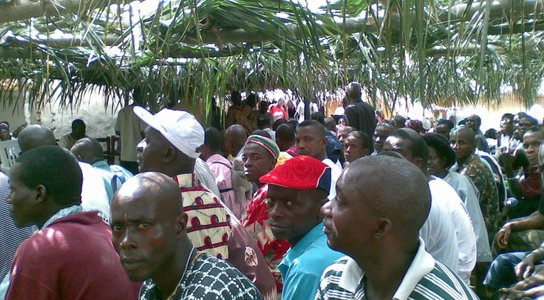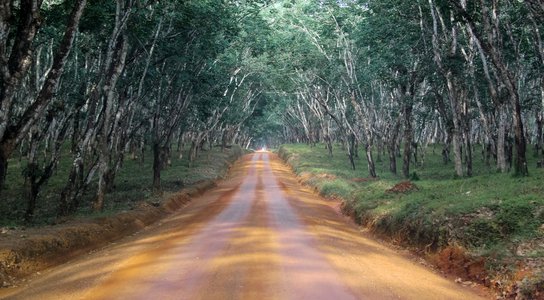In a move critical for the future of Liberia’s forests, Liberia and the World Bank have now published their plan for spending US$37.5 million to reduce deforestation within the country. (1) The plan, which uses money promised in 2014 by Norway to save Liberia’s forests, includes much needed support for communities who want to manage their forests. However, if Liberia is to successfully turn the page on a history of destructive logging it must also make good on pledges to investigate illegal contracts and ensure communities’ right to free, prior, and informed consent is respected.
Liberia contains some of West Africa’s best remaining rainforest and an estimated half of the country’s population is dependent upon forests for their livelihoods. The country has a history of forest mismanagement, including trade in conflict timber and widespread illegal logging. However, in recent years Liberia’s government has striven to reinstate the rule of law, prosecuting former officials who have broken the law and cancelling some illegal contracts. Particularly promising, in 2014 Liberia and Norway signed a US$150 million deal designed to switch Liberia from logging to community forestry and conservation. (2)
“Liberia has made good on key promises in its 2014 agreement with Norway to protect rainforests, committing support to upwards of 75,000 Liberians so they can manage forests covering 6,000 km2,” said Alice Harrison of Global Witness. “By helping communities plan and develop governance systems, providing information on different economic uses of forests, and supporting NGOs that work with communities, the Liberian government and the World Bank have outlined a plan that may help Liberians benefit from their forests.”
The timing of the plan, contained in a World Bank Project Assessment Document (PAD), could not be better. In October 2015, the Liberian government hosted a conference in partnership with Global Witness, Rights and Resources Initiative, and the NGO Coalition of Liberia. (3) At the conference, titled Rethinking Liberia’s Forests, participants called for support to communities wishing to manage their forests, including data on how they should sustainably manage resources. (4)
Reforms of Liberia’s forest sector cannot succeed, however, if they do not also tackle illegal logging. The failure to address illegalities in the sector has undermined the effectiveness of Liberian and donor reform programmes since the end of the country’s civil war in 2003. The 2014 Liberia-Norway agreement recognized this need, and included pledges by Liberia to conduct an independent investigation into potential illegal contracts, and cancel those it found to be breaking the law. Unfortunately this investigation is missing from the World Bank plan, and appears to have been replaced by a commitment that existing contracts will be reviewed only if new contracts are to be assigned.
“Liberia’s promise to investigate remaining illegal logging contracts served as a cornerstone of its agreement with Norway,” said Harrison. “Nearly ten percent of the country is still covered by logging concessions, many of which were awarded illegally and are held by companies who have failed to pay their taxes. In May, the government took steps to address some of this illegality by halting the operation in one concession, but there is a great deal left to do. If Liberia is to successfully conserve its forests and if communities are to manage their forests free from illegal loggers, it is crucial that the government maintain its promise to investigate and cancel illegal contracts.” (5)
Also important to the success of the plan is ensuring that rights of communities to make decision about the use of their land are respected when Liberia and the World Bank are creating new forest reserves. In the 2014 deal, Liberia committed to create reserves called “protected areas” as a means of conserving forests. These would be created with the agreement of communities who own the forest, employing the procedure recognized internationally as free, prior, and informed consent. In the recently-published PAD, however, the Liberian government and the World Bank commit to establishing new reserves covering 3,200 km2, but make no promise to respect communities’ right to decide what happens to the forests they own.
“Research, including that published in February by Rights and Resources Initiative, shows that forest reserves cannot succeed if the FPIC rights of forest owners are not respected,” said Harrison. “And while this week’s plan implementing the Liberia-Norway agreement contains important support for some communities, critical changes should be made to ensure forest laws are enforced and communities in proposed reserves are not disenfranchised.” (6)
/ ENDS
Contacts
Notes to editor:
(1) World Bank, Liberia Forest Sector Project, 19 April 2016, available at documents.worldbank.org/curated/en/2016/05/26343866/liberia-forest-sector-project.
(2) Global Witness, US$150 million partnership between Norway and Liberia to stop logging, 23 September 2014.
(3) See www.rethinkingliberiasforests.org.
(4) See www.rethinkingliberiasforests.org/report.
(5) Global Witness, Avoiding the Riptide, June 2013; Global Witness, Save My Future Foundation, and Sustainable Development Institute, Signing their lives away, September 2012; New Dawn, FDA Halts Liberian Hardwood, 3 May 2016.
(6) TMP Systems, Rights and Resources Initiative, Protecting Liberia’s Forest: Conservation for people and planet, 3 February 2016.
You might also like
-
Rethinking Liberia’s Forests conference: Reporting back

-
US$150 million partnership between Norway and Liberia to stop logging

-
The Deceivers: Edmonds and Groves
The former England cricketer, his business partner and their stock market empire built with bribery and scams